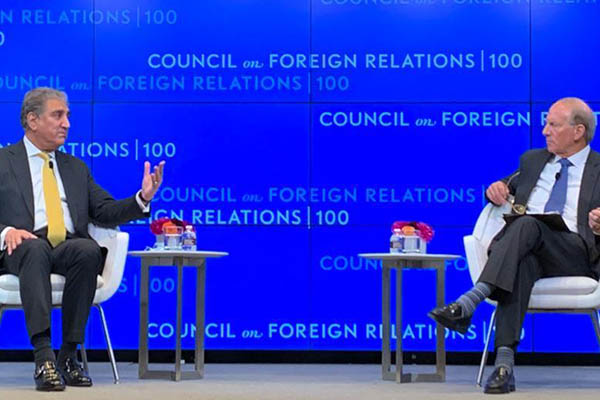
Photo courtesy Shah Mahmood Qureshi
Foreign minister stresses isolating Afghanistan has proven a mistake in the past that should not be repeated
Foreign Minister Shah Mahmood Qureshi on Tuesday said that Pakistan desires a “multidimensional” relationship with the U.S. following Washington’s exit from Afghanistan, adding that their future ties should be built on trade, investment, and people-to-people contacts.
“With the end of the U.S. mission in Afghanistan, Pakistan wants to build a more broad-based and multidimensional relationship with the United States,” he said in a keynote address at the Council of Foreign Relations in New York, where he is currently representing Pakistan at the U.N. General Assembly.
Stressing that Pakistan wanted to break the “cyclical pattern” of its relationship with the U.S., he said that an economically strong Islamabad would be “an anchor of stability” in the region. Pakistan wants to work with the U.S. in areas that would create jobs and economic prosperity on both sides of the Pak-Afghan border and help Afghans rebuild their country, he added.
Qureshi emphasized that isolating Afghanistan had proved a mistake in the past and reiterated calls for the international community to encourage Kabul toward a more inclusive government through sustained engagement. He also reiterated claims that an unstable Afghanistan government could create space for terrorist groups to regain ground in the war-torn state.
“While the Taliban should be held to their commitments on counter-terrorism, human rights, and political inclusivity, the immediate priority must be to help the Afghan people as they confront a potential humanitarian crisis,” he said.
Pak-Indo ties
Addressing Pakistan’s ties with India, Qureshi reiterated that Prime Minister Imran Khan had offered dialogue to Indian P.M. Narendra Modi shortly after taking office. “India not only rebuffed Pakistan’s peaceful overtures, but destabilized the entire region by its illegal actions of Aug. 5, 2019, in occupied Jammu and Kashmir,” he said of Delhi’s unilateral abrogation of Jammu and Kashmir’s special constitutional status.
He claimed that while Pakistan had remained committed to finding a peaceful solution to the Jammu and Kashmir dispute, it was India’s responsibility to create an enabling environment for a meaningful and result-oriented dialogue.
Lashing out at India’s human rights violations, the minister said Delhi had failed to suppress the Kashmiri freedom struggle, adding that its actions after the death of Syed Ali Shah Geelani had “inhumane.” He hoped the international community would not sacrifice to political expediency the principles of self-determination and freedom for Kashmiris.
The Council of Foreign Relations is a leading think-tank in the U.S. and publishes the influential Foreign Affairs journal.
